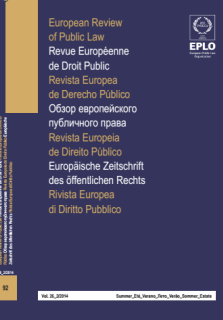
Constitutional Law / Droit constitutionnel
2013
RUSSIA / RUSSIE
ALEXANDER KHURSHUDYAN
Junior research fellow of Constitutional and Administrative Law,
Law Faculty of St. Petersburg State University
OLGA KUDRYASHOVA
PhD, Associate Professor of Constitutional and Administrative Law,
Law Faculty of St. Petersburg State University
DENIS KUSTOV
Assessor of the Constitutional Court Department
of Constitutional Foun¬dations of Public Law
SERGEY OLENNIKOV
PhD, Associate Professor of Criminal Law,
Law Faculty of St. Petersburg State University
MAKSIM SUHODOLOV
Post-graduate of the Law Faculty of St. Petersburg State Univer¬sity
The Russian constitutional developments in 2013 were predetermined to a large extent by the reformation of the political system which had taken place in the previous year. The number of the measures implemented in 2012 became the subject of constitutional review. In 2013, the Constitutional Court was very active in deciding cases concerning the election process and voting rights. The year 2013 was also marked by the significant constitutional reform of the judicial system, under which the Supreme Arbitration Court was abolished. This year also showed a tendency of strengthening the national security protection. The migration policy and the liability for violation of migration provisions were seriously toughened. Restrictions on human rights were established under the imperatives of national security protection. They concerned the Russian officials who possessed foreign property assets as well as the USA citizens acting against Russia. The protection of national cultural values was invoked as the ground for restricting the rights of sexual minorities and blasphemers.
En 2013, les évolutions constitutionnelles en Russie ont été déterminées dans une large mesure par la réforme du système politique qui a eu lieu au cours de l'année précédente. Un certain nombre de mesures appliquées en 2012 a fait l'objet de la révision constitutionnelle. En 2013, la Cour constitutionnelle a déployé une importante activité en jugeant des cas relatifs à la procédure électorale et au droit de vote. L'année 2013 a également été marquée par l'importante réforme constitutionnelle du système judiciaire, qui a aboli la Cour suprême arbitrale. Elle a aussi montré une tendance au renforcement de la protection de la sécurité nationale. La politique de l'immigration et la responsabilité pour violation des règles en la matière ont été sérieusement durcies. Les limites des droits de l'homme ont été subordonnées aux impératifs de la protection de la sécurité nationale. Elles ont concerné les officiels russes possédant des biens à l'étranger et les citoyens américains agissant contre la Russie. La protection des valeurs culturelles nationales a été invoquée pour fonder des restrictions aux droits des minorités sexuelles et des blasphémateurs.





















